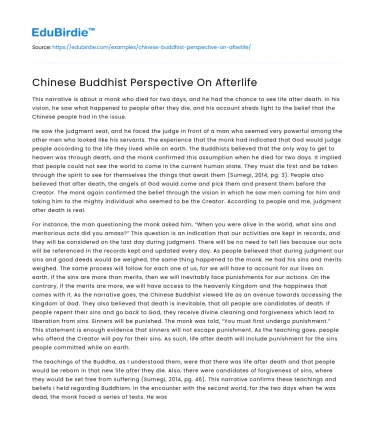This narrative is about a monk who died for two days, and he had the chance to see life after death. In his vision, he saw what happened to people after they die, and his account sheds light to the belief that the Chinese people had in the issue.
He saw the judgment seat, and he faced the judge in front of a man who seemed very powerful among the other men who looked like his servants. The experience that the monk had indicated that God would judge people according to the life they lived while on earth. The Buddhists believed that the only way to get to heaven was through death, and the monk confirmed this assumption when he died for two days. It implied that people could not see the world to come in the current human state. They must die first and be taken through the spirit to see for themselves the things that await them (Sumegi, 2014, pg. 3). People also believed that after death, the angels of God would come and pick them and present them before the Creator. The monk again confirmed the belief through the vision in which he saw men coming for him and taking him to the mighty individual who seemed to be the Creator. According to people and me, judgment after death is real.
For instance, the man questioning the monk asked him, “When you were alive in the world, what sins and meritorious acts did you amass?” This question is an indication that our activities are kept in records, and they will be considered on the last day during judgment. There will be no need to tell lies because our acts will be referenced in the records kept and updated every day. As people believed that during judgment our sins and good deeds would be weighed, the same thing happened to the monk. He had his sins and merits weighed. The same process will follow for each one of us, for we will have to account for our lives on earth. If the sins are more than merits, then we will inevitably face punishments for our actions. On the contrary, if the merits are more, we will have access to the heavenly Kingdom and the happiness that comes with it. As the narrative goes, the Chinese Buddhist viewed life as an avenue towards accessing the Kingdom of God. They also believed that death is inevitable, that all people are candidates of death. If people repent their sins and go back to God, they receive divine cleaning and forgiveness which lead to liberation from sins. Sinners will be punished. The monk was told, “You must first undergo punishment.” This statement is enough evidence that sinners will not escape punishment. As the teaching goes, people who offend the Creator will pay for their sins. As such, life after death will include punishment for the sins people committed while on earth.
The teachings of the Buddha, as I understood them, were that there was life after death and that people would be reborn in that new life after they die. Also, there were candidates of forgiveness of sins, where they would be set free from suffering (Sumegi, 2014, pg. 46). This narrative confirms these teachings and beliefs I held regarding Buddhism. In the encounter with the second world, for the two days when he was dead, the monk faced a series of tests. He was supposed to meet the judge and receive punishment for his sins. However, I understood that the Buddha would forgive people their sins if they confessed, and this belief remained strong in the Buddhists religion. One of the men handling the monk advised him to confess his sins, and to his surprise, there was a balance between the sins and the merits. It meant that any confession could convert the sins into merits, hence the surprise balance between the two extremes. The Buddhists believed in a better life after death, and I maintained this belief as well. The monk proved this belief on his return journey when he experienced the life that the other monks lived. The monk suffered a mistaken identity for misfortune when he went for judgment before his days were over to live on earth. The Buddhists believed that life on earth determined the kind of life that one lived after death. Like any other religion, Buddhism taught its followers to remain faithful and do meritorious practices which will prevent any possible punishment. Through his experience, the monk confirms my understanding of the teachings and beliefs of Buddhism. There will be life after death, and the nature of this life will depend on the life that people lived while on earth. If the individual lived well, and the merits are more than sins, then he or she will live well in the afterworld.
The place reserved for such people will be full of joy, just like what the monk saw on his way back to the earth. Therefore, according to the Buddhism religion, life after death and liberation from suffering are real.
Reference
- Sumegi, A. (2014). Understanding Death. An Introduction to the Ideas of self and the Afterlife in World’s Religions. John Wiley & Sons Ltd, the Atrium, Southern Gate, Chichester, West Sussex, PO19 8SQ, UK.






 Stuck on your essay?
Stuck on your essay?

